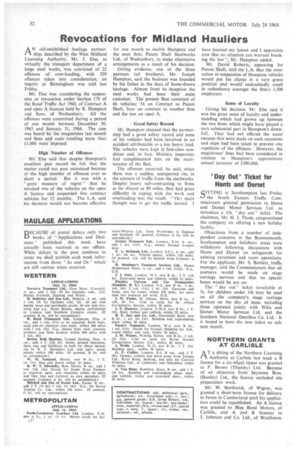Revocations for Midland Hauliers
Page 34

If you've noticed an error in this article please click here to report it so we can fix it.
.1-1
A N old-established haulage partner
ship, described by the West Midland Licensing Authority, Mr. J. Else, as virtually the transport -department of a large steel works, was convicted of 22 offences of over-loading, with 529 offences taken into consideration, an inquiry at Birmingham was told last Friday.
Mr. Else was considering the suspension or revocation under Section 178 of the Road Traffic Act 1960, of Contract A and open A licences held by R. Hampton and Sons, of Wednesbury. All the offences were committed during a period of one month between December 30, 1963 and January 31, 1964. The case was heard by the magistrates last month and fines and costs totalling more than £1,000 were imposed.
High Number of Offences Mr. Else said that despite Hampton's excellent past record he felt that the matter could not pass unnoticed because of the high number of offences over so short a period. But it was with a "great measure of regret" that he revoked two of the vehicles on the open A licence and suspended five contract vehicles for 12 months. The L.A. said his decision would not become effective for one month to enable Hampton and the steel firm, Patent Shaft Steelworks Ltd., of Wednesbury, to make alternative arrangements as a result of his decision.
Giving evidence, one of the three partners (all brothers), Mr. Joseph Hampton, said the business was founded by his father in the days of horse-drawn haulage. Almost from its inception the steel works had been their main customer. The present fleet consisted of 66 vehicles; 54 on Contract to Patent Shaft, four on contract to another firm and the rest on open A.
Good Safety Record Mr. Hampton claimed that the partnership had a good safety record and none of his vehicles had been involved in an accident attributable to a too heavy load. The vehicles were kept in first-class condition and, in fact, Ministry inspectors had complimented him on the maintenance of the fleet.
The offences occurred, he said. when there was a sudden, unexpected rise in the amount of traffic from the steelworks. Despite heavy sub-contracting to firms as far distant as 80 miles, they had great difficulty in coping with the work and overloading was the result. "Our main thought was to get the traffic moved. I have learned my lesson and I appreciate now that no situation can warrant breaking the law ", Mr. Hampton added.
Mr. David Roberts, appearing for Patent Shaft, told the L.A. that the revocation or suspension of Hampton vehicles would put his elienit.s in a very grave position and would undoubtedly result in redundancy amongst the firm's 1,500 employees.
Sense of Loyalty Giving his decision, Mr. Else said it was the great sense of loyalty and understanding which had grown up between the two firms which might have played a very substantial part in Hampton's downfall. They had not offered the usual excuses that were made on such occasions and steps had been taken to prevent any repetition of the offences. However, the magistrates' fines had been considered in relation to Hampton's approximate annual turnover of £300.000.
















































































































